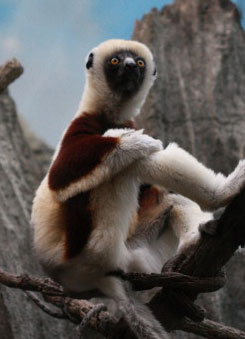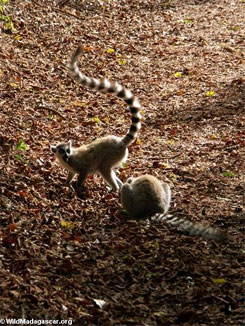What’s happening in Madagascar and what does it mean for conservation?
31-Mar update | 30-Mar update | 23-Mar update
Political turmoil in Madagascar has wrecked the country’s emerging ecotourism industry and is now threatening to undo decades of conservation work.
The conflict between President Marc Ravalomanana and Andry Rajoelina, a former DJ who was, until recently, mayor of the capital city, Antananarivo, has locked the Indian Ocean island nation in a violent struggle since January. More than 130 have been killed in demonstrations.
Rajoelina—backed financially and politically by former president Didier Ratsiraka, France, and, allegedly, industry interests keen on developing newly discovered oil reserves and other resources—has accused Ravalomanana of being a dictator for heavy-handedness in closing down opposition media outlets, failing to control security forces during recent protests, buying a $60 million presidential jet despite national poverty, amending the constitution to run for a third term, and supporting an ill-conceived scheme to lease large tracts of agricultural land to South Korea, a controversial proposition in a country where most people live on less than two dollars per day and nearly half of children under five years of age are malnourished. While the 34-year-old Rajoelina is too young under the Madagascar’s constitution to become president, he is nonetheless popular in Antananarivo and apparently stage a coup with support from the military against the democratically elected — but increasingly autocratic — Ravalomanana on Tuesday. Rajoelina is now president, although it is unclear for how long.
 Coquerel’s Sifaka
|
The political crisis has brought to a near standstill Madagascar’s $400-million-a-year tourism industry. A spate of countries, including Britain and the United States, have warned travelers against visiting the country.
“The 400 million dollar tourism industry has just been leveled, and that means trouble ahead for the forests of Madagascar,” said a local conservationist. “This coup d’etat undermines everything we have worked for for 30 years.”
ANGAP, the national parks service, has closed several parks because it can no longer take responsibility over them.
“Foreign traders have arrived in local towns seeking to take advantage of the political crisis that has weakened park protection and enforcement,” said another source who operates near a critical conservation area. “This is the worst, by far, that has happened to the park in recent years. The situation is worse than desperate.”
“The impact here is beyond our worst fears,” said a member of a Malagasy NGO. “This is typically the low season for tourism, but we are seeing no visitors.”
Conservation in Madagascar is highly dependent on income from tourism. Half of park entrance fees are returned to communities living in and around protected areas. Without this source of income, locals in some areas may be forced to turn to conservation areas for timber, fuelwood, and agricultural land.
Madagascar has a lot of offer tourists. Separated from mainland Africa for 160 million years, 80 percent of flora and fauna are unique to the island. Madagascar is home to such evolutionary oddities as the fossa, a carnivorous mammal that looks like a cross between a puma and a dog but is closely related to the mongoose; the indri, a cat-sized lemur that leaps from tree to tree with ease and sings eerie, whale-like songs; and the sifaka, a lemur that swears rudely but dances like a ballet performer. It has baobab trees, which look like they’ve been planted upside down; the rosy periwinkle, a delicate flower used to cure pediatric leukemia and Hogkin’s disease; and an entire desert ecosystem consisting of just spiny plants, but no native cactus. On top of its biodiversity, the residents of Madagascar — the Malagasy — have equally unusual origins as reflected by their mixed traditions and cultural practices. The Malagasy speak a language most similar to one in Borneo (across the Indian Ocean in Indonesia) and observe some distinctly southeast Asian religious practices; use Arabic-rooted words for months and days of the week; and greatly treasure African Zebu cattle.
NOTE: For their protection, sources are not named in this article








